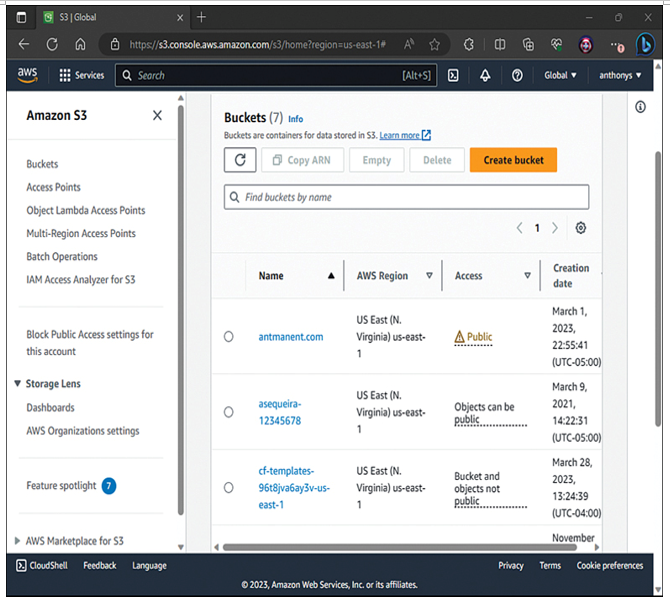Storage Services
The demands placed on storage for digital information today are higher than ever before—and getting bigger all the time. It is no wonder that AWS offers many services in this regard. The list that follows highlights just some of the important services we will discuss further in this text:
Simple Storage Service (S3): AWS S3 is object storage with a simple web service interface for storing and retrieving any amount of data from anywhere on the web. It is designed to deliver 99.999999999% durability. This means that the amount of time per year you are not going to be able to access your data should be only 315 microseconds! You can use S3 for a vast number of purposes, such as primary storage for cloud-native applications or a bulk repository (or “data lake”) for analytics. It is so flexible and so easy to work with that there are far too many potential uses to list. Figure 1-4 shows the AWS S3 dashboard in the web-based GUI.

Figure 1-4 The AWS S3 Service
Elastic Block Store (EBS): EBS provides persistent block storage volumes for use with EC2 instances in the AWS Cloud. Each Amazon EBS volume is automatically replicated within its Availability Zone to protect you from component failure, offering high availability and durability. EBS volumes offer the consistent and low-latency performance needed to run workloads. With Amazon EBS, you can scale your usage up or down within minutes—all while paying a low price for only what you provision.
Glacier: Amazon Glacier is part of the AWS S3 storage service. It is a secure, durable, and extremely low-cost storage service for data archiving and long-term backup. With Glacier, you can reliably store large or small amounts of data for as little as $0.0036 per gigabyte per month. Glacier provides different price options for access to archives, depending on whether you need access immediately or in several days. It is important to carefully plan when purchasing Glacier archive services because the speed at which you can recover data is directly related to your choice of pricing option.
Elastic File System (EFS): AWS EFS provides simple, scalable file storage for use with AWS EC2 instances in the AWS Cloud. You can even use this service for on-premises servers in your organization. EFS is easy to use and offers a simple interface that allows you to create and configure file systems quickly and easily. EFS fully integrates with the Network File System (NFS) storage protocol that is popular with Linux systems.
